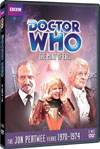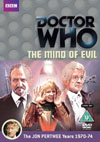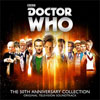The Mind of Evil
 |
 |
 |
DVD NTSC
Region 1




|
DVD PAL
Region 2


|
VHS Video (BW)
NTSC
 A A

NTSC
 B B

NTSC


PAL


|
|
(Doctor Who Story No. 56, starring Jon Pertwee)
- written by Don Houghton
- directed by Timothy Combe
- produced by Barry Letts
- music by Dudley Simpson
- 6 episodes @ 25 minutes each, now re-colourized
|
Story: The Doctor and Jo investigate
a new method of reforming criminals at Stangmoor
Prison, whilst U.N.I.T. has the unfortunate task
of disposing of a decommissioned missile while
also providing security for a peace conference.
Where will the Master's next target be?
And what is the dark secret at the heart of
the Keller Machine?
|
|
DVD features include:
- All six episodes restored to full colour.
- Audio commentary by
director Timothy Combe,
producer Barry Letts,
script editor Terrance Dicks,
actors Katy Manning (Jo Grant),
Pik-Sen Lim (Captain Chin Lee / wife of writer Don Houghton),
Fernanda Marlowe (Corporal Bell / wife of William Marlowe [Mailer] ),
and stunt arranger Derek Ware.
Moderated by Toby Hadoke.
- Making-of featurette (23 min.), with
Letts, Dicks, Combe, Lim, Marlowe, and
Nicholas Courtney (Brigadier Lethbridge-Stewart).
Shot on location at Dover Castle in 2009.
- "Now and Then" location featurette (7 min.)
- Behind the Scenes - 24 hours in the life of Television Center (from 1971, 24 min.)
- Pop-up Production Note Subtitles
- Photo Gallery (5 min.)
Buyers' Guide Review
by Martin Izsak
|
|
(A more in-depth analysis, containing "SPOILERS" and intended
for those who have already seen the program, can be accessed
here.)
|
This is the one that blew the budget on season eight, providing
us with all the location footage and action that makes a great
UNIT story, but forcing preceding
"Terror of the Autons" and
following "Claws of Axos"
to make do with more Colour Separation Overlay (the BBC's version of
chromakey / blue screen) and cheaper, smaller sets.
The first half of the story gives
us some of the best of what season eight has to offer, but the second
half, while still delivering a lot of good stuff, has lost the
ability to trigger the audience to anticipate it, what with the
Man of Sleep
and his assistant playing prisoner for most
of it, and many of the threats becoming more repetitive
by the minute.
The cast members get their best introductions of the season in
this one, starting with the Doctor and Jo discovering the prison
castle and exploring its people and concepts thoroughly in a number
of witty scenes. A few lines from Jo neatly lead into the appearance
of the Brigadier, where he and Captain Yates and Captain Chin Lee
are all easy to get to know and understand, and the issues and plots
that will occupy the UNIT portions of the story are laid out as clear
as a bell. Clear as a Corporal Bell in fact.
The Brigadier's office in this story is about the best office he
ever gets on the program, much nicer than the Doctor's lab from the
previous story. It's a pity, and a budget curiosity, that UNIT
never seems to live in the same rooms from one story to the next,
always moving and/or redecorating. The only exception I can really
see happens between
"Planet of the Spiders" (story no. 74) and
"Robot" (story no. 75), where the
Doctor's lab is carefully laid-out in the same fashion.
Episode One works extremely well. The dialogue is rich, and
the dual mysteries work well, with hints of interconnectedness
thrown in to make the juxtaposition of scenes flow smoothly.
Also the sci-fi element of the Keller machine is fresh and
satisfactorily explored here, combined with the social aspect
of the issue of reforming criminals.
When we catch our first glimpses of the Master and
Sgt. Benton, each is highlighted well in his introductory
sequence. Thus, "The Mind of Evil" turns out to be the best story
around to introduce the main cast of six regulars for the middle
Pertwee Era. Benton gets great exposure for his first scenes, but
doesn't always get a lot to do afterwards.
The Master gets some of his best character development in this
story, much better than that of
"Terror of the Autons" (story no. 55).
He and the Doctor get to square
off together quite often all throughout the story. Some scenes
still bleed old worn-out "prisoner vs. captor" routines, but even
those scenes are still more believable than the "Terror of the Autons"
confrontations. Additionally, the cooperative side of the Doctor's
relationship with the Master comes out, giving credence to the rumour
that they were old friendly rivals back in the Academy on their home
planet. "The Mind of Evil" rounds out the Master's character; he just
wouldn't be the same without this adventure.
|
Also, here Dudley Simpson completes
the composition of an entire suite of music for the Master which will
follow him throughout the season. His famous theme, based on bits
from the previous story, comes together here for the first time,
along with many more soon-to-be-popular Master tracks. The
"hypnosis" track returns in a new and slightly reworked version,
and his stylish sting from the previous story is about the only bit
of unaltered music used. The electronic style this time around is
held back and more subdued, concentrating more on recognizable
musical harmony and less on strange new sound.
The sound of the Keller machine is a unique and recognizable
contribution, and Simpson complements this with an equally memorable
theme for the Keller machine, the two working together to maximize
the suspense for numerous scenes.
Simpson also brings back his UNIT theme from
"The Ambassadors of Death" (story no. 53)
to good effect,
although the rendition of it here is far more primitive and cheesy.
All these elements combine to give "The Mind of Evil" the most
influential score of the entire Pertwee Era, but it has its share
of flaws - tracks like the very first one in episode one that sound
very silly and distracting.
|
Music by Dudley Simpson, sound by Brian Hodgson
"The Master's Theme",
"Dover Castle",
"Keller Machine Theme", and
"Keller Machine Appears/Vanishes"
are available on:
|
All of the above tracks, plus
"Hypnosis Music"
are also available on:
|
|
The contributions of Pik-Sen Lim are also very much worthy of
note. Not only does she play Captain Chin Lee to near perfection,
her position as the writer's wife allowed her to suggest the whole
idea of the peace conference, and supply dialogue and pronunciation
coaching in several Chinese dialects. These elements are the icing
on the cake for an enthusiast of cross-cultural bonding like myself,
and the peace conference angle gives Jon Pertwee's Doctor an
unparalleled opportunity to be a proactive peacemaker and heroic
investigator during the better episodes. "The Mind of Evil"
just wouldn't be near as excellent without it.
But silliness mounts quickly in the poorer episodes. Not
only is Jon Pertwee's Doctor reduced to his weakest state of
"Man of Sleep" yet on the program, but Jo is given nothing more to do
but blubber over him, while the audience is forced to either watch
or abandon the show in disgust. "Blubber" scenes like this are
the lowest quality recurring dynamic in Doctor Who stories, even worse
than missing Doctor episodes, so "The Mind of Evil" earns some huge
minus marks here. We all know the main character isn't going to die
in the middle of his adventures, so writers be warned: Don't waste our
time! Idle threats bore! Other portions are
equally fruitless in relieving his heroic impotence,
although I'll have to save my detailed dissection of the story's
structure and all its entailing SPOILERS for the
In-depth Analysis version of this review.
"If that's the best you can do, Doc, it really ain't good enough."
The quantity
of prisoner dynamics here spells doom for the story, cancelling out its
plus marks for the peace conference / Chinese angle and bringing the
story as a whole back to average level for a season eight adventure.
No wonder that the chap who made himself a colour copy later wiped
all but five minutes of his tapes, thinking the story was not very good.
All is not lost during such sections
for the villains continue to
develop themselves and escalate their plans well.
And though UNIT proves to be a poor excuse
for military might at first,
it gets its act back together before long, showcasing
the power of what it can do when it gets itself good and organized.
This story features one of the most creatively directed
and effective of UNIT's shoot-outs, but something else is wrong.
...And I'll only let on what that is in the
In-depth Analysis version of this review.
Episode Five also contains a great sequence with our hero
coming to grips with the essence of this story, but I'll say
no more about that for those who have yet to see the story.
Great stuff.
And, his tale about Sir Riley's potatoes and the Tower of London,
combined with a choice piece of medieval-sounding music
("Dover Castle", available on CD above), bring yet
another stylish touch to the story.
The conclusion picks up tremendously from what has gone
before, but still has its problems.
We get an
exciting ending that pulls plenty of surprise punches, although
it includes a bit of dead air-time as well.
The Master's motives are still a bit on the grey and fuzzy side
of things here. Exactly why is it good for him to make all the
plans that he does?
At times it looks like the poor Master played his cards
in the wrong order or something. An epic 10-part story combining the
previous one with this one, and re-sequencing the order of some of the
events, might also have
solved a lot of motivational problems for his character as well.
This adventure's coda
appears a bit contrived, and rather lamely depends on easily
forgotten events from the previous story.
"The Mind of Evil" is a good story, but sadly most of the best
bits are in the first half, so a viewer's lasting impression of it
may easily be a disappointing aftertaste.
This story is available in colour on DVD, or in black and white on VHS video.
 |
 |
 |
The VHS video also features a short sequence explaining the necessary
ingredients for the colour restoration process, with approximately
five minutes of recolourized footage from "The Mind of Evil".
|
DVD NTSC Region 1
for the North American market:

 in the U.S.
in the U.S.

 in Canada
in Canada
| DVD PAL Region 2

 for the U.K.
for the U.K.
| VHS Video (black and white)
NTSC
 A A
 in the U.S.
in the U.S.
NTSC
 B B
 in the U.S.
in the U.S.
NTSC

 in Canada
in Canada
PAL

 for the U.K.
for the U.K.
|
Comments on this article are welcome. You may contact
the author from this page:
Contact page
|










